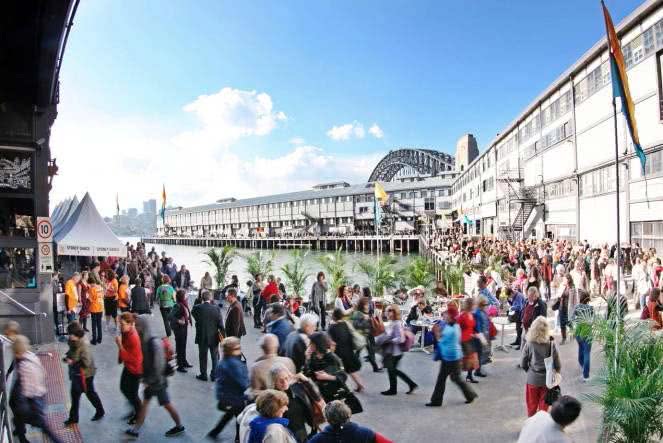The Sydney Writers’ Festival descended upon our fair city last week, transforming our piers and theatres into a hub where storytelling, panels and plotting were all chewed over by writers and readers alike.
It was a unique experience, one that left us walking away with a number of key lessons. Lessons, in fact, that went a lot like this…
Hosting A Panel Is Hard…
For all the story hounds out there, one of the most anticipated events of the Writers’ Festival was This Won’t End Well, a panel on short story writing featuring three of the art form’s most towering titans: Joy Williams, George Saunders and Tara June Winch. Unfortunately, the event turned out to be the only real let down of the festival. Not that the panellists were to blame, mind you – they were dry, illuminating and intellectually generous to a fault, with the scorching wit of Williams in particular something to behold.
No, the problem lay in the panel moderator, author Tegan Bennett Daylight. Perhaps understandably nervous, Daylight dominated the conversation, interrupting authors with her own (usually unwarranted) insights, reading long, often irrelevant quotes she had pre-prepared, picking awkward bickering matches with the bemused Williams, and generally keeping the conversation at the most cosmetic level imaginable. “What was that?” one audience member said as the crowd filed out, shooting angry looks at Daylight. Sadly, the question was pertinent indeed.
…But Some People Really Nail It
By contrast, Slate’s Julia Turner provided a masterclass in panel hosting. Leading American Carnage, a discussion on the fallout of the American election, Turner kept her subjects – Saunders, author Colson Whitehead and journalist Mona Chalabi – engaged and involved. Her own quick wit and wide breadth of knowledge made the event a true highlight: an illuminating conversation centred around a politician whose shadow hung heavy over the entire festival. Speaking of which…
Trump Has Writers Stunned
Over the course of the festival, there weren’t many conversations that didn’t in some way involve the US President. The Preener In Chief was frequently nominated as a kind of antithesis to literature – a walking mass of lies and disinformation – and was perhaps most eloquently taken down by Brit Bennett (more on her later) in a startling opening address that linked Trump’s success with the insidious side of nostalgia. Pondering the phrase “Make America Great Again” Bennett pointed out that there was no better time than now to be a black woman in the United States, an acknowledgement that elicited claps and murmurs of agreement in equal measure.
Just as pertinent – and quietly shocking – was the story of election day, relayed by a still visibly shaken Colson Whitehead. The author of 2016’s exceptional The Underground Railroad took great pains to describe his own election day party, taking the audience through a celebration that quickly soured into a wake as increasing numbers of Whitehead’s friends began to shuffle out the worse Clinton’s chances got.
Philosophers Are Fun!
Full of her trademark wit and humour, Sarah Bakewell, author of the brilliant At The Existentialist Café: Freedom, Being And Apricot Cocktails, made existentialism a comedic, illuminating riot. Readymade for events like a Writers’ Festival, Bakewell’s book – an exploration of the personal, oft-neglected side of some of this century’s most radical thinkers – flew off the shelves after the show – and for damn good reason.
Brit Bennett Is The Future Of Literature
Brit Bennett is the author of only one novel – the electrifying The Mothers – but you wouldn’t be able to tell. The young author was an engaging, endlessly fascinating interview subject, and one of the festival’s true stand-out guests. At one point, Festival Director Michaela Maguire called her “impossibly wise”. Couldn’t have put it any better myself.
Q And A Sessions Can Be Great
It’s the words that can turn the blood of so many writers’ festival guests cold: “and now we’re going to audience questions.” Disturbingly often, those who choose to take to the mic do so in order to show off, or score some cheap laughs, or to spend fifteen minutes on a rambling monologue more akin to a statement than a question. But this year, far from being a cringe-inducing horror show, the writers’ festival question sessions were illuminating proof that fielding queries from the crowd doesn’t have to be a kind of mortifying endurance test, and those who asked things of their favourite authors did so politely and with grace. Thank god.
George Saunders Is A Goddamn International Treasure
Every one of acclaimed author George Saunders’ appearances at the festival was an electric, crackling delight. Not only is the man one of the most important voices we currently have, he is a generous and engaged interview subject, willing to share both the intricacies of his craft and his thoughts on the international mess we currently find ourselves mired in. We can only hope he hits our shores again sometime soon.
SWF 2017 Was An Overwhelming Success
On the opening night of the 2017 writers’ festival, McGuire laid it all out on the line and said she thought this year was going to be the best yet. And she was right. From the happy, easygoing audiences, to the excellent crowd management, to the kindness of the volunteers, and the stunning quality of the guests, SWF was a bona fide success story, and all involved deserve high praise indeed. The bottom line is this: there are few events in Sydney’s cultural calendar that can compete with the Writers’ Festival. It is, in no unabashed terms, a marvel – an expertly organised experience custom-built for readers and writers alike. Bring on 2018.


































